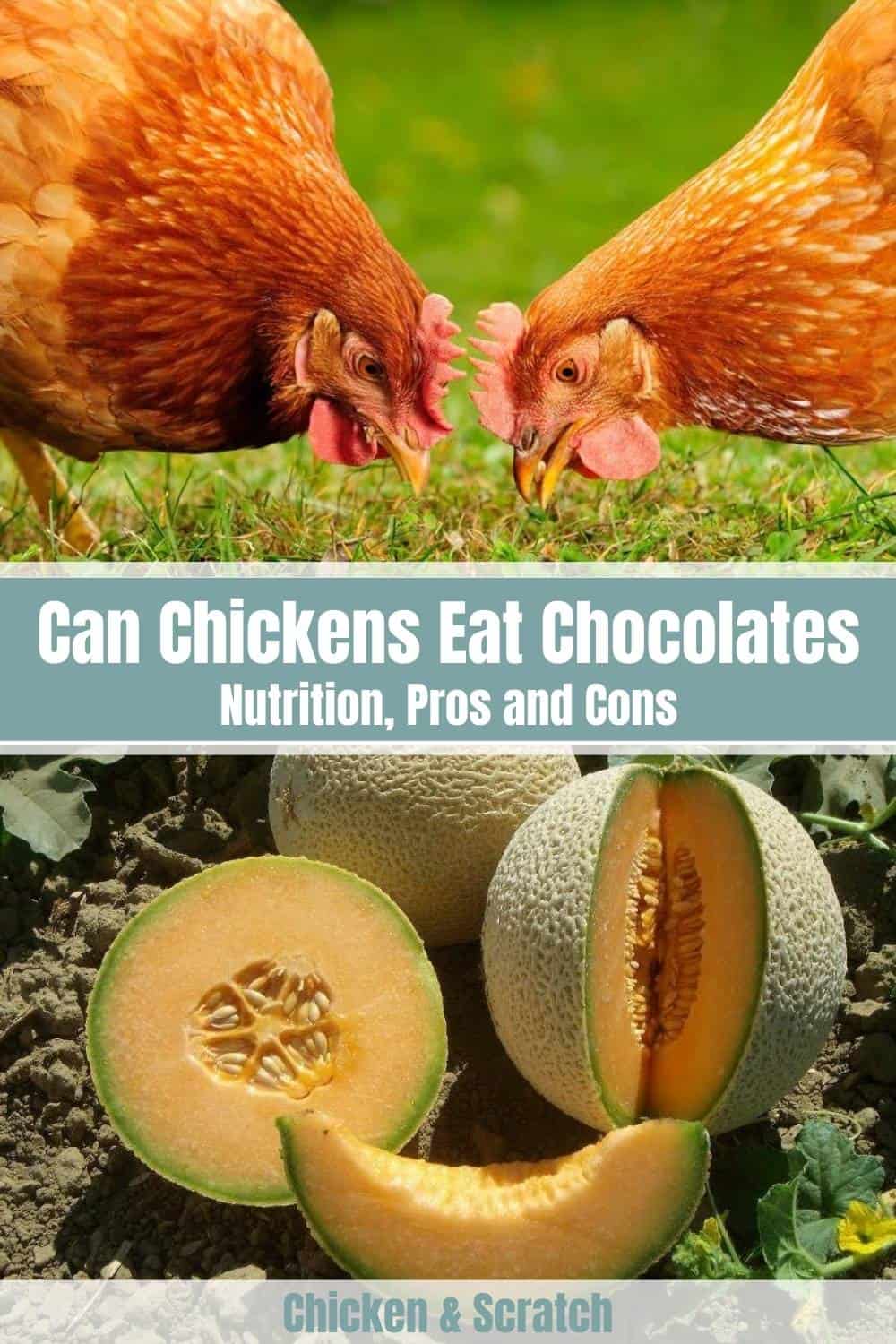Fruits have been a colorful part of humans’ diet. They supply good things and are even necessary and helpful in keeping our health steady and robust. Having this good notion of fruits, you may ask, perhaps, can chicken eat cantaloupe? Fruits are good, and it pays to know if it’s safe for your chicken friends.
What is Cantaloupe?
Cantaloupe can be a foreign name to those who haven’t encountered it yet. Perhaps, it may sound costly and out of reach. While that’s the impression most people get, cantaloupes are very available and affordable. It is part of the Cucurbitaceae family. Inside this family are also honeydew melons, cucumbers, and watermelons. While they may be in the same family, these are different fruits, making their name.
This fruit is very famous, especially during the summer times. They are the perfect fruits to quench thirst and provide a good flavor for the summer. This fruit is favorite of adults and kids as they taste good and are very refreshing. Cantaloupe is also termed as:
- Muskmelon
- Rockmelon
- Mush melon
- Persian melon
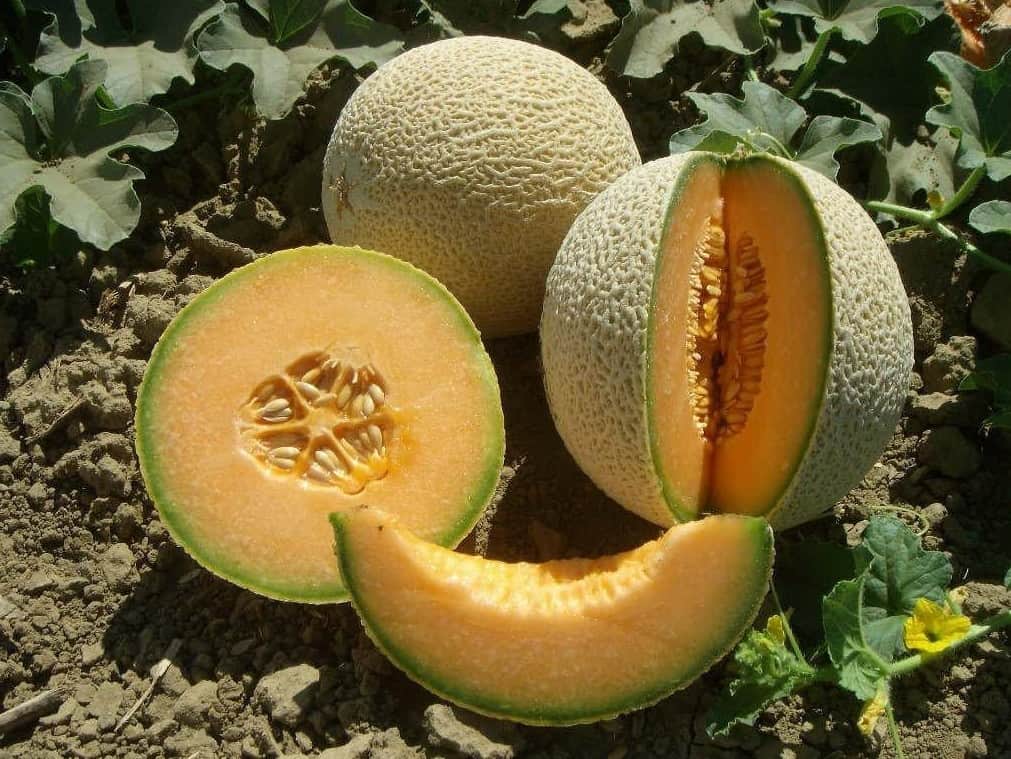
Cantaloupes have an orange interior, quite famous and known by almost everyone, especially in the US. The peel is a combination of a white and green netted pattern. When you think this family has all the variations it could have, there’s still more to know of!
Cantaloupes also have their categories. The variations are usually location-based as these fruits can come in slightly different appearances. The types of cantaloupes will be introduced as follows:
Asian cantaloupes
The orange of the interior is quite different. Asian cantaloupes are much paler. You can expect it to be very light orange instead of a bright shade. Its exterior pattern is also quite loose. Meaning the net designs are not so emphasized. The texture of Asian cantaloupe is also different, being crispier and having softer flavors.
European cantaloupes
Often termed the “true cantaloupe,” it’s not because the remaining ones are fake but because of the history. This type of cantaloupe may or may not have the netted pattern on its peel at all. This type of cantaloupe has a musky feel in both the smell and flavor of its fruit.
Charentais cantaloupe
This sweetheart is one of the crowd favorites as it is considered one of the best types of cantaloupe. They are not that big and probably just about the same size as grapefruits. The remarkable part of this cantaloupe is the bright orange interior and the lovely and distributed sweetness of its fruit!
Chickens and Cantaloupes
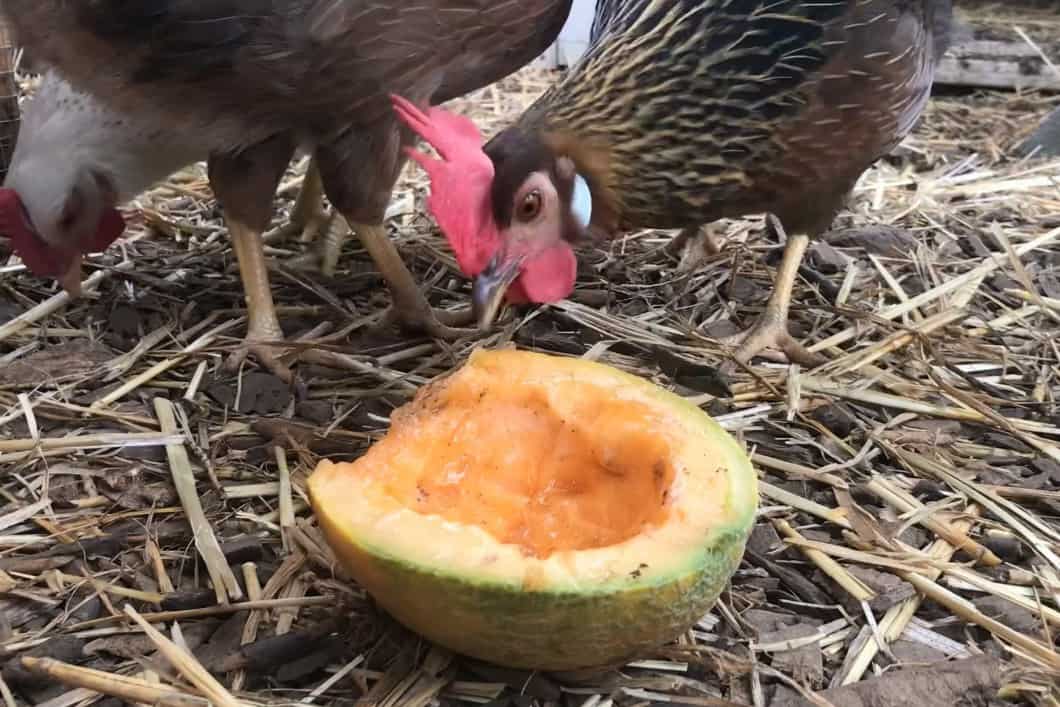
Humans enjoy cantaloupes so much, you may ask, is it the same for chickens? The answer is yes! Chickens love and enjoy eating cantaloupes. Cantaloupes are good, especially for summers.
Chickens are easily dehydrated, and so that’s why there’s a need to monitor their water even more so during the summers. On the other hand, cantaloupes provide a quench for thirst and flavor not only for humans but also for your flock! It’s an excellent combination to have a thirst-quenching food for an easily dehydrated flock.
Cantaloupes are safe for your chickens. In fact, they are one of their favorite fruits out there. Not only are cantaloupes safe, but they also offer a lot of helpful nutrients to your flock, just like how they do to humans. Cantaloupes give your chicken friends the following:
100g Cantaloupe Nutrition
Nutrient | Value |
energy | 34 kcal |
water | 90.2 g |
protein | 0.84 g |
fat | 0.19 g |
carbohydrate | 8.16 g |
fiber | 0.9 g |
sugars | 7.86 g |
Vitamin C | 36.7 mg |
Vitamin K | 2.5 ug |
Manganese | 0.041 mg |
iron | 0.21 mg |
potassium | 267 mg |
magnesium | 12 mg |
phosphorus | 15 mg |
sodium | 16 mg |
zinc | 0.18 mg |
folate | 21 ug |
Giving your flock cantaloupes is both a joy and a healthy meal for them. Cantaloupes are suitable thirst quenchers with the sweet and refreshing flavor that will make your flock happy and refreshed. Vitamin C helps relieve your chickens from stress.
This vitamin can boost them up and support their immune system to be more vigorous. Vitamin A helps in the average growth of your flock. It also assists in the normal function of reproduction. These helpful vitamins help keep their cells in good condition.
Minerals, on the other hand, help in good bone formation and growth for your chickens. Along with this are the formation of blood cells, energy metabolism, blood clotting, and enzyme activation.
They assist in a lot of activities inside your chicken’s body. Minerals are also in charge of proper muscle function. Robust chickens require all these things to function correctly and work together. These functions emphasize the importance of minerals for your chickens.
Cantaloupes sound great and all, but it’s good to remember that these fruits should also be taken in moderation. In short, do not entrust all your flock’s nutrition in one fruit. It’s good to give them variety. Besides, nothing beats a meal that’s constructed and curated for the welfare of chickens.
Preparing Cantaloupes for Your Chickens
Chickens love to eat cantaloupes. In fact, they eat cantaloupes in different ways. Yes, there are many ways to consume cantaloupes for humans; what about chickens? Since chickens have these strong beaks, people may think they can just peck their way into cantaloupes. While this is a good idea, it’s still beneficial to prepare food like this for your chickens.
Chickens are not choosy at all! They are the type to eat what is presented or eat what they find edible in their eyes. However, as poultry owners, there are better ways to take care of their food.
A way of preparing cantaloupes can be effortless. The first is to wash the fruit thoroughly. Chickens care about the cleanliness of the food, and if it looks dirty, they tend to avoid it. Then, you can slice it into bite-sized pieces.
After cutting the fruit, it’s better to cool it up in the refrigerator. This also helps in making the fruit more appealing in the hot weather. It’s important to remember that once you have cut the cantaloupe, it should be consumed within 2-3 days. This is to avoid harmful pathogens laying their nest in the sliced fruits.
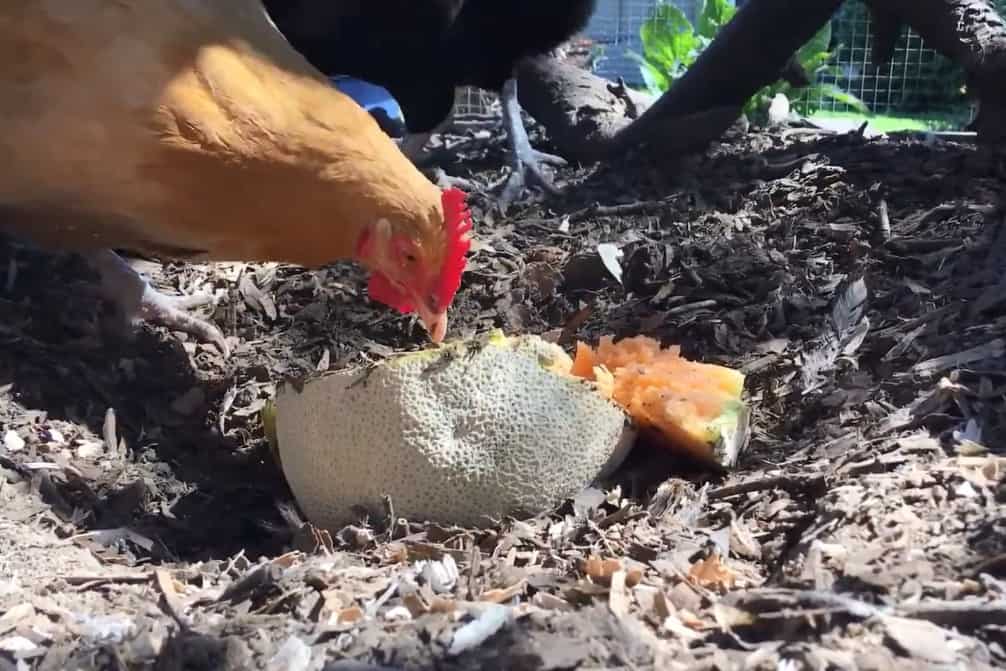
Another way of preparing cantaloupes for your flock requires more effort. You can try peeling the cantaloupe and slicing them into small dices for better access and easier intake for your chickens.
News flash! Chickens also eat the rinds and seeds of cantaloupes. There’s not a wasted part of this fruit. You can prepare the rind by drying it and perhaps mixing it with their feed or giving it for snacks. As for the seeds, you can scoop them and blend or grind them. The ground seeds can then be mixed with yogurt. This combination is one of their favorites.
Although not so particular in flavors and the visual appeal of their food, Chickens appreciate new flavors. Thus, it would be nice to incorporate fruity flavors like cantaloupe in their everyday meals. This way, they will be giddy and excited to eat and try more.
Other Fruits For Your Chickens
Fruits have been one of man’s best friends. Well, not only humans have taken a liking to them but most of the animals too. Chickens love fruits too. However, certain limitations and restrictions are present to keep them safe and away from imminent danger.
Some of the chicken’s favorite fruits are bananas, grapes, cantaloupes, and watermelons. Fruits are essential in a chicken’s diet too. Thus, it’s beneficial for flock owners to take note of the fruits available around them. Good food makes good chickens! Here are some other fruits you can give to your chickens.
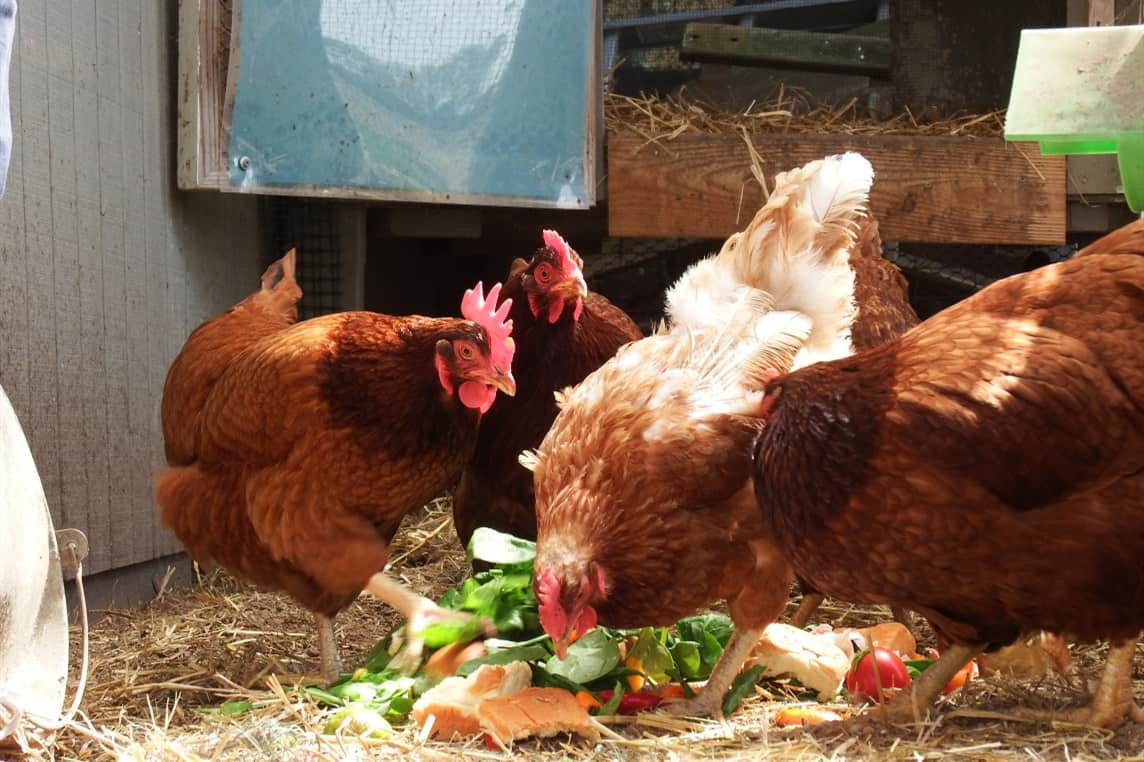
Apples
Apples are a yes, but you are sure to get the seeds off of them when you feed your chickens. Apple seeds have cyanide and so be sure to remove them. For easier consumption and digestion, it would be beneficial if you chopped them. It can either be diced, minced, or even processed with a food processor.
Blueberries
Blueberries are perfectly safe for your chickens to eat. They love berries and eat almost any berries around them. Not only are they tasty, but berries are also full of vitamins and antioxidants. A little reminder that even though berries are safe to eat, moderation is still needed to avoid diarrhea and other complications.
Cherries
Cherries are also on the list of fruits with a good supply of vitamins. Cherries have vitamins A, C, K, E and a good amount of minerals too. Cherries also have a component called choline. Choline is something beneficial and vital to a chicken’s health. Giving them cherries now and then is a good idea.
Chickens still have many unmentioned fruits that they can try out. They love fruits except for citrus ones. However, it’s important to watch your chicken’s intake of fruits. Most fruits are sweet, and so, they contain relatively high levels of sugars. Excess sugar can cause upset stomachs or gastric problems for them.
Summary
Overall, fruits are great! But of course, there is a limit to everything. Can chickens eat cantaloupe? The answer is yes, but as always, they should eat in moderation. Too much of everything can be harmful. This has been proven valid for humans, animals, and even plants! Taking care and managing your chicken’s diet is essential in raising poultry.
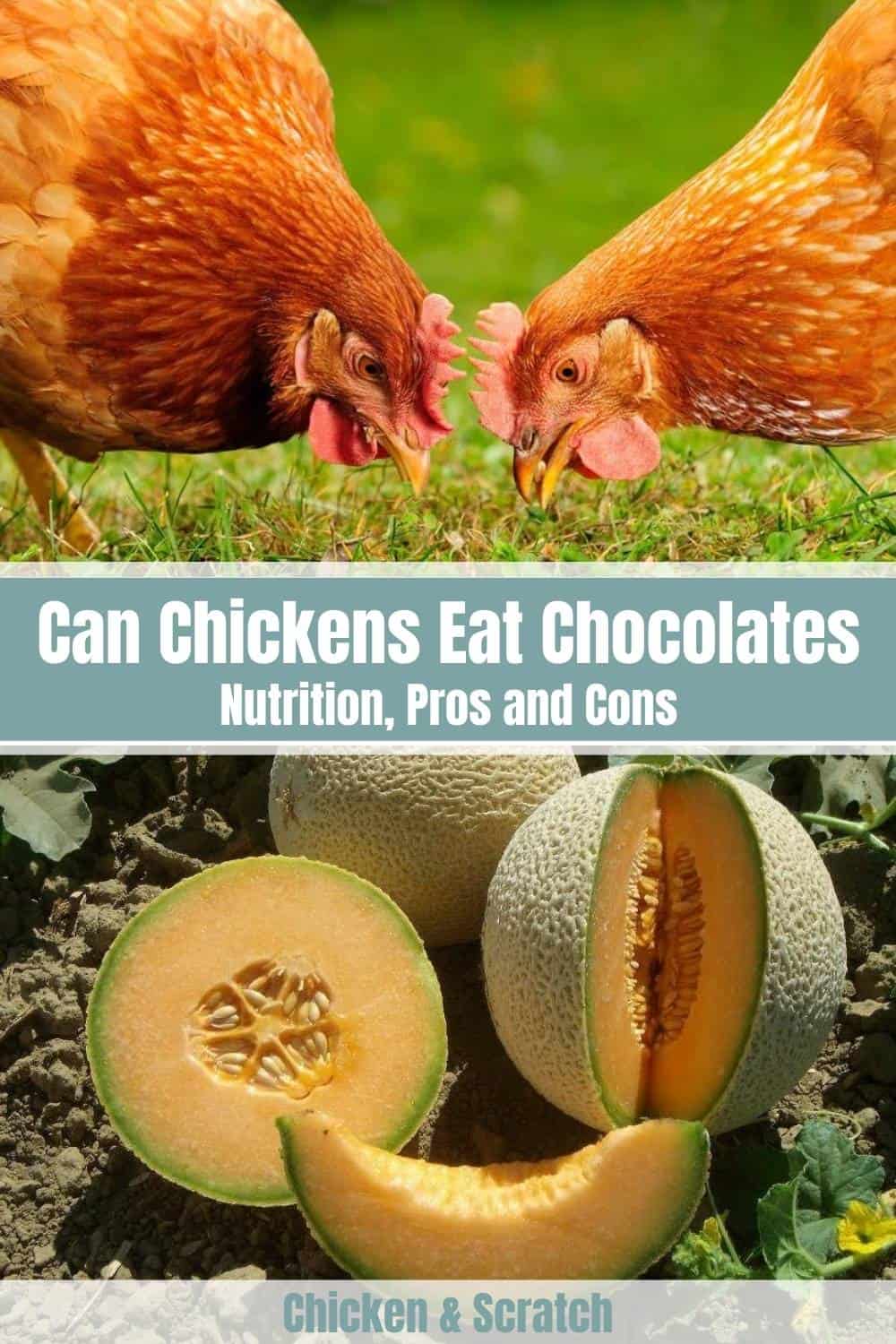

Joseph Hudson has been raising chickens for over 15 years. In 2018, he completed the Agriculture & Natural Resources program at Mt. San Antonio College. He currently raises over 1400 chickens on his 7.5-hectare farm. He keeps sharing his experience on raising healthy and happy chickens on Chicken Scratch The Foundry.
